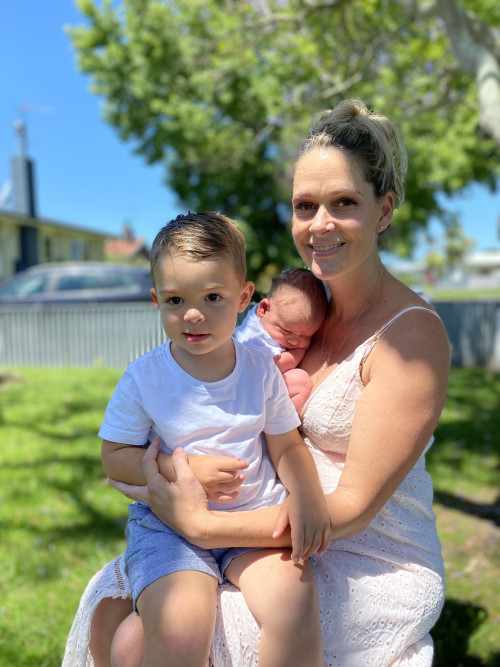
The gift of donor milk not only fed Zachary-James Murphy but it helped clear up his jaundice.
It came at just the right time for the newborn who was undergoing phototherapy and was in line for a blood exchange transfer if that did not work.
“The milk was key to helping reduce jaundice,” mum Kimberly Aukett says.
Zachary-James was born via caesarian section on 6 January at Hawke’s Bay Hospital. He was a healthy boy weighing in at 4.17 kg (9.1 lb) although he developed jaundice – which is a yellow colouring of the skin and whites of the eyes.
Ms Aukett’s milk was yet to come through so she was unable to give Zachary-James enough milk to feed him and help clear his jaundice.
In these circumstances, donated breast milk can be given to babies but the hospital’s supply had been depleted.
Ms Aukett found a friend of a friend with a six-week-old baby who was willing to come in and express milk.
“We fed him with the donated milk through the night and by the morning his colour was much improved.”
Zachary-James was given donated milk for the next two days until Ms Aukett’s milk was established and she could feed him herself.
“I was so grateful to receive donated breast milk and am in awe that another mother went out of her way to help our family.”
It’s the second time the family has used donor milk.
“My first child spent some time in the Special Care Baby Unit (SCBU) after an emergency C-section and we used the hospital’s donor milk until my milk came in.”
As her way of giving back, Ms Aukett donated her own milk to the hospital’s bank once her supply was established and she intends to do so once more.
“When you go through something like this you realise just how important it is to have a supply of donated milk.”
Te Whatu Ora Breastfeeding Advisor, Liz Banks always welcomes women wanting to donate milk if they meet the eligibility criteria.
“We are very fortunate to have an accredited unpasteurised Donor Milk Bank. If infants require a supplement for medical reasons, and the supply is there, we are able to offer mothers a choice of donated breast milk or formula, under the guidance of a midwife or health professional. Like all supplements informed consent is required. Our goal is that donor milk is offered as a short-term solution, in an effort to support long-term breastfeeding.
“Having a supply of donated milk that can be given to infants in SCBU or the post-natal ward really helps provide the newborn pēpi key nutrients in the first days of life, or until the mother’s milk supply is established.”
Mrs Banks said the screening criteria for women who wish to donate breastmilk is very strict. Donors undergo a lifestyle and blood screen before their milk is accepted.
“Some whānau are happy to share their milk as a private arrangement, as the Aukett family did. With all milk sharing, mothers need to be aware that the person has a healthy lifestyle and is clear of any infections. If the mother is planning to breastfeed it is essential she expresses or continue to breastfeed in order to protect her own milk supply,” Mrs Banks said.
Ms Aukett urged other mums to consider donating milk to the hospital’s milk bank.
“Just do it, you don’t know who you might be helping but I know they will be as eternally grateful as I was.”
If you wish to find out more about donating breastmilk please email: Elizabeth.banks@hbdhb.govt.nz






Post your comment
Comments
No one has commented on this page yet.